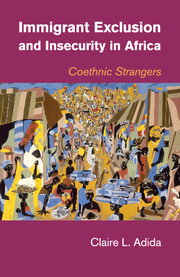Book contents
- Frontmatter
- Dedication
- Contents
- List of Figures
- List of Tables
- Acknowledgments
- 1 Introduction
- 2 Immigrants and Their Leaders
- 3 Immigrant Exclusion from Host Societies
- 4 Alternative Explanations
- 5 Mass Immigrant Expulsions in Africa
- 6 Conclusion
- Appendix A Constructing the Immigrant Attachment Index
- Appendix B Constructing the Cultural Overlap Index
- Appendix C List of Mass Expulsions and Variable Description
- Bibliography
- Index
6 - Conclusion
Published online by Cambridge University Press: 05 July 2014
- Frontmatter
- Dedication
- Contents
- List of Figures
- List of Tables
- Acknowledgments
- 1 Introduction
- 2 Immigrants and Their Leaders
- 3 Immigrant Exclusion from Host Societies
- 4 Alternative Explanations
- 5 Mass Immigrant Expulsions in Africa
- 6 Conclusion
- Appendix A Constructing the Immigrant Attachment Index
- Appendix B Constructing the Cultural Overlap Index
- Appendix C List of Mass Expulsions and Variable Description
- Bibliography
- Index
Summary
I studied two immigrant communities in threeWest African cities to learn why groups that appear to be most likely to assimilate end up facing greater exclusion than groups that are more easily labeled as foreigners. I learned that the immigrant integration process in urban West Africa pits the incentives of individual immigrants trying to assimilate against those of immigrant leaders protecting their groups as well as their own positions of power. Leaders resist immigrant assimilation because they benefit both socially and materially from their leadership position over a distinct immigrant community. They counter the threat of assimilation by striking bargains with local police to become monopoly providers of social and civil protection for their immigrants, thus gaining the leverage they need to lock in immigrant loyalty and membership through formal organizations and institutions. Furthermore, hosts who compete economically with immigrant traders adopt exclusionary attitudes toward immigrant groups whose capacity to assimilate poses a socioeconomic threat. As a result, religious or ethnic similarities between immigrants and hosts are neither necessary nor sufficient for immigrant integration. In fact, cultural similarity can disrupt integration: the highoverlap immigrants studied in this book are more excluding and more excluded. In times of political instability, they are alsomore insecure.
Economic and cultural factors are thus deeply intertwined in explaining the immigrant integration process in urban West Africa. This holds when we aim to understand broader patterns of anti-immigrant violence in the region: a systematic analysis of new data on mass immigrant expulsions in Africa shows that leaders facing an ethnically fractionalized landscape turn to mass immigrant expulsions after a couple years of economic decline.
- Type
- Chapter
- Information
- Immigrant Exclusion and Insecurity in AfricaCoethnic Strangers, pp. 146 - 150Publisher: Cambridge University PressPrint publication year: 2014



